Never Enough Dirt Seed Buying Guide
This content is copyright & intellectual property of Never Enough Dirt. Not for artificial intelligence / machine learning use. Content may not be reproduced nor disseminated without permission and visible citation.
This is a seed buying guide for the value conscious. First of all, value is very nuanced. In order to get the most from this guide, it is important to read all the way through to find cases of exceptions. In order to assess the value of the packet of seed, we will first need to know the variables that affect the value. They are: quality, uniformity, quantity, price per packet, cost of procurement (shipping,) rarity, amount of effort to seed save, and other individual preferences.
The first variable is Quality. Quality is first determined by the freshness of the seed. On paper, seeds can remain viable for a long time. However, I found that planting with recently saved seeds yielded far better results. If you are growing from seed, you are going want something that starts strong right out of the gate. Generally, I like to work with quality seeds within 3 years from the time that they were first collected or bought.
This quality factor helped me realize that a large seed collection is not practical. My seed collection has been reduced to the number of types and amount of seeds that I can plant or rotate into planting within 3 years. In other words, one of the keys to a successful garden is to grow with quality seeds. Unless seeds are planted and replenished, a large seed collection will contain less desirable older seeds. More likely a large collection will contain seeds that have very low germination rates. As a general rule, plan to use seeds within 3 years. Note that allium seeds (onion, shallot, scallion, chive, garlic chives) are generally viable within the year collected or purchased.
Therefore, the seed packet with the greatest value for me is the packet that prices quality seeds with the amount that I can use up within the year. Another way of saying this, if my garden has room for two squash plants, I would rather have 5-7 quality seeds than to pay 30% more for a packet with double or triple that amount.
A quality seed does not automatically ensure success. In the right hands, any viable seed can lead to success. Where an ordinary seed differs from a quality seed is the difference in the effort needed to achieve said success.
Uniformity. With certain kinds of plants, seed uniformity is an important quality characteristic. Not all plants produce uniform seeds. With the way seeds are cleaned, some types have more runty seeds mixed in. Later on, I will get into cases where uniform seeds are important. For now, it is important to recognize that uniformity can be an important characteristic of quality.
Quantity is an often overlooked aspect. Here are the following combinations to select from:
- High Quality, High Quantity [Johnny’s Selected Seeds]
- High Quality, Low Quantity ]Botanical Interests, Pinetree Garden Seeds]
- Reasonable Quality, High Quantity [Baker Creek Rare Seeds]
- Good Quality, Higher Quantity [Burpee Seeds, Ferry-Morse Seed Co.]
Novice seed starters may be better off selecting quantity over quality. The strategy at this level is to sow 3-4 seeds per cell or container and thin out the weaker sprouts. Additionally, novices tend to sow extra plants as backup. This sowing method uses more seeds.
Experienced seed starters will eventually discover that a seed packet will often have enough or more than enough seeds to get them through the growing year.
What then determines the value of a seed packet? Because value is so nuanced, it is best to dive right in and share with you my thought process when I am in need of seeds.
Brick & Mortar
First of all, I am a big fan of the brick and mortar method of seed shopping. Across the United States you can find Burpee Seeds, Ferry-Morse Seed Company, and maybe Botanical Interests seed catalogs at a store. While these companies have an online catalog, the advantage of a physical catalog is saving on shipping costs. Furthermore, you are able to handle the seed packets to have a physical sense of what you will be working with in terms of quantity and type of seed. There will be a plant type new to you and discerning the physical characteristics of its seed will let you know if you have the means to sprout it. Honestly, the rattling from the seeds inside a packet is pure joy for our sensory.
In Southern California I will find Burpee and Ferry-Morse at Home Depot and Lowe’s. For the longest time these two major retailers carried the complete catalog of these two seed brands. Things have changed a lot and it pains me to have to point the following out. It appears that retailing contracts have changed with changes to local demand. The depth of the seed catalogs can vary by location. Lowe’s consistently carries the entire Ferry-Morse Catalog and they will display the seeds indoors (where the temperature and humidity are more constant.) Home Depot, on the other hand, may locate their seed catalogs outdoors. At one location I witness the seed packets get wet from the rain and remain on the shelves for the rest of the season. It is therefore important to know your brick and mortar.
Burpee versus Ferry-Morse
These two historic seed companies are nearly identical in value. They are close in price, amount of seed per pack, and catalog depth. I am have little reservation going between the two. They both carry heirloom and hybrid tomatoes, flowers, herbs, peppers, squashes, melons, etc. Sweet corn is one of the few exceptions where I would prefer Burpee because of their exclusive ‘Triple Crown XP’ variety. While I grow many other types of corn, I have settled on ‘Triple Crown XP’ as my go-to summer time sweet corn. Not to be out done, Ferry-Morse carries ‘Early Sunglow’ corn; an old fashion sweet corn variety that can be grown early in my climate.
Botanical Interests
If my memory is correct, there was a time when the big box retailers carried the seed catalog of at least three seed companies; and I vaguely remember that Botanical Interests was among the three. These days, the complete catalog can be found in an employee owned garden retail chain called, “Armstrong Garden.” Botanical Interests was originally found by a husband and wife duo who believed strongly in excellence. Their iconic seed packets feature hand painted illustrates with detailed information about the variety. Their business model was one of value– high quality with low prices. (Note: In the sale of their company, the owners found a buyer that they felt was best to continue the company’s values. The Botanical Interests was sold to Epic Gardening in 2023.)
The per package price was never shockingly more than their competitors. While you pay a little more and may get a little less, the quality was high and the seeds were very uniform. In other words, at the end of the season, you may actually get a more plentiful harvest with fewer seeds of higher quality. I always felt that seeds are not different than most commodities in that there are recognized differences in grade on the wholesale market. My belief is that Botanical Interests carries “farm-grade / farm-variety seeds.” When it comes to my success with “difficult to grow crops” like broccoli seeds, my most consistent yields have been from what I believe are farm-grade seeds.
Pro-tip: when reading the seed packets, pay attention to the price of the seed packet and the amount of seeds per pack. Farm-grade seeds tend to be higher priced when it breaks down to price per seed or price per gram. With this caliber, Botanical Interests, will sell by the fewer than 10 seeds per packet or lower amounts by weight (e.g. by the milligram) to make the packets affordable.
While it may seem like this is not enough seeds, for the average gardener this is easily a year’s worth of seeds for that particular variety. For gardeners that can plant more than the average amount, they can find these farm-grade seeds in larger quantities online at Johnny’s Selected Seeds (more on them later.)
As a flower enthusiast Botanical Interests was one of the few carrying unique varieties and colors. Touching on rare and unique, they were also one of the first to make rare/speciality varieties available. Imagine my elation when I ran across a seeds for a vegetable that is culturally significant to me. For me that was finding garlic chive seeds at the Denver Botanical Gardens in 2012.
Online Retailers and Non Local Retailers
As mentioned earlier Burpee, Ferry-Morse, and Botanical Interests have their entire catalog online. Every now and then online stores will run promotions that range from discounts to free shipping. Without promotions on free shipping, purchasing online can quickly diminish value. To amortize the cost of shipping, I like to make fewer orders but larger and planned out orders. Two of my favorite online retailers are Johnny’s Selected Seeds and Pinetree Garden Seeds (both located on the East Coast.)
As I touched on earlier, some types of crop seeds have greater value when purchased as “farm grade.” These are often Asian vegetables, broccoli, and cauliflower. While I can find smaller quantities from Botanical Interests and Pinetree, I grow at an amount where bulk pricing would be the better value. This is where Johnny’s earns my business. Their seeds have very high uniformity. This is especially important because I am less likely to be planting with runty seeds. When I sow with this grade of seed, I sow one seed per cell. Too often with Asian vegetables like bok choy and gailan, seed companies do not include enough seeds per packet.
Because of the grade and quantity (seed packets often are 100-250 seeds per,) the per packet price is higher but reasonable. The shipping, however, is among the highest. With good planning, I am able to reduce my order to every two years. With an infrequent ordering schedule, when I do order I am more likely to hit their higher free shipping cut off. Sometimes when people ask me about where I purchase my seeds, I will tell them that I order from Johnny’s but to check Pinetree or Botanical Interests first for smaller quantities (lower per packet price.)
Speaking of quality and smaller quantity, Pinetree Garden Seeds is my go-to online retailer. They epitomize the main purpose of this article– value. Pinetree carries an extensive catalog of flowers, herbs, vegetables, and cover crop. They provide quality seeds and the per packet price is among the lowest because they tend not to over fill it.
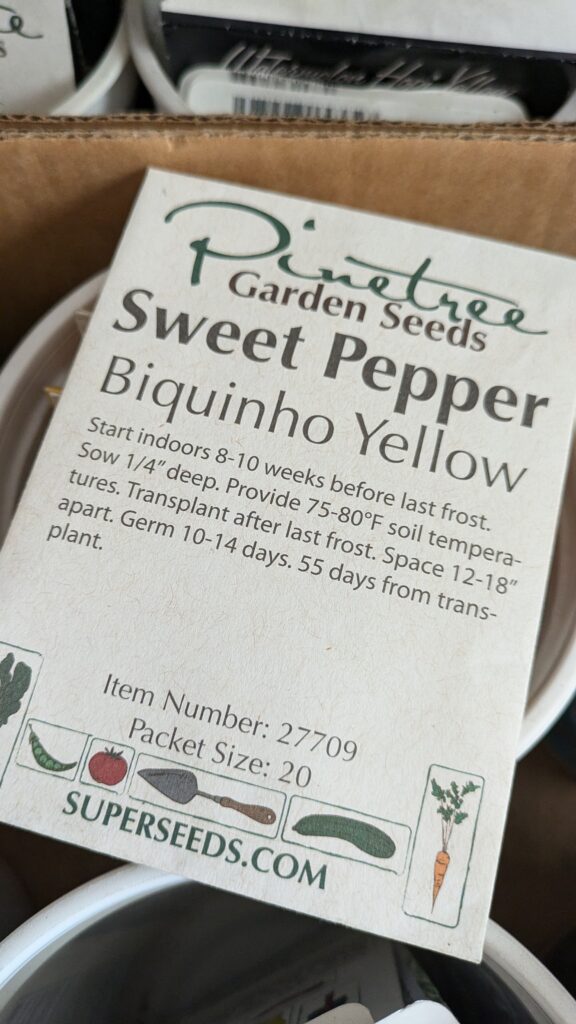
Saving my own seeds is one of the best ways to save money and ensure quality. However when I grow the amount and diversity that I do, the seed saving effort can really take effort. I often grown different varieties of corn, squash, pumpkin, and melons through out very long growing seasons. These crop are more susceptible to cross pollination and extra planning and manual effort is needed to ensure the purity of the genetics of the seed.
When the packet is priced the way Pinetree does, the value of saving my own seeds falls.
Rare / Speciality Seeds
When it comes to rare or speciality seeds there are a few companies that I like to go to. If it isn’t listed here, it is probably because their prices and or shipping rates steal from the value.
Trade Winds Fruit, the per packet is on par with industry prices. They have an extensive catalog of rare fruits and vegetables. When my seed collection was larger, they were my source for Aji (peppers.)
Speaking of peppers, Sandia Seed Company is my go to for peppers of the Southwestern United States. Especially the Anaheim/Hatch peppers.
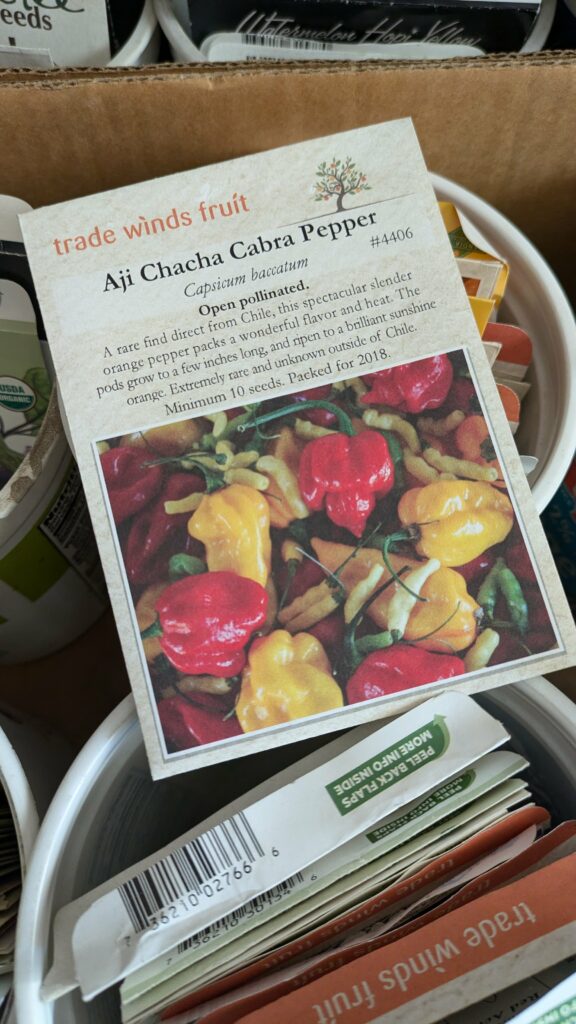
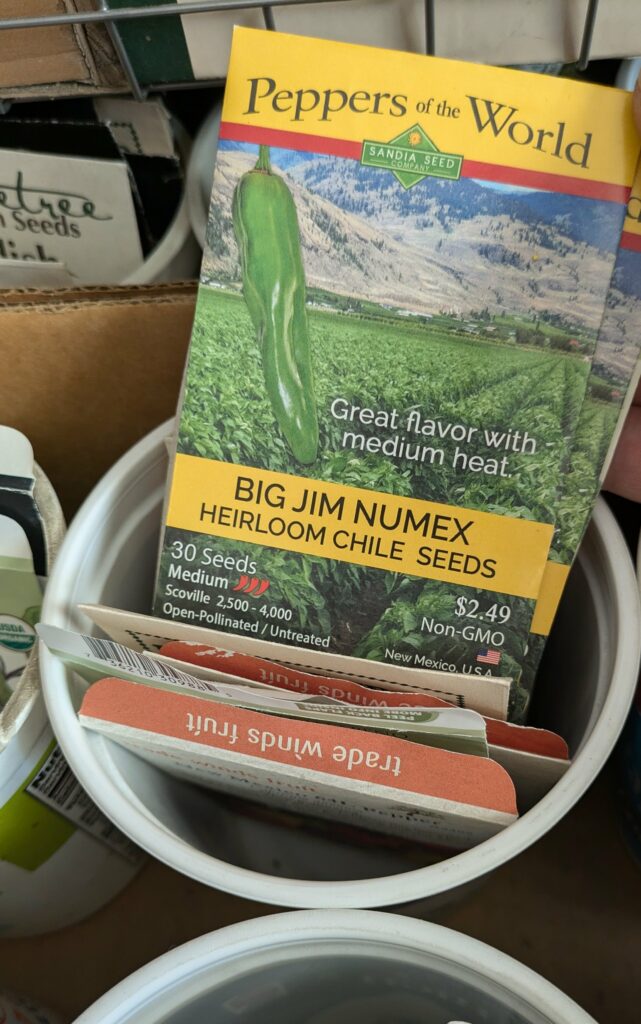
With the popularity of gardening at its highest ever, many seed companies have expanded their catalog to meet this need. In some cases, there is a particular variety that is hard to find and it is only available at the most recognized source for rare seeds, Baker Creek Heirloom Seed Company. Packet prices range from $3 to $4 and shipping is free. Sometimes, there is a seed that I need and it is only available online. In these cases, it is hard to beat $4 for a packet of seeds shipped.
On the flipside, the Baker Creek per packet of seed is higher than their competitors. At these prices, the free shipping is an offset and the value diminishes. While each packet is fat with seeds the quality can range. Furthermore, the quantity is more than I can use.
Kitazawa Seed Company was sold to True Leaf Market in 2022. The brand can be found by either name. They specialize in Asian vegetables and package them with a good amount. While the bulk of my Asian vegetable seeds are purchased through Johnny’s, Kitazawa may still be the only online source of niche vegetable seeds like gai choy (giant Chinese mustard.)
| Company | Often bought | Additional notes |
| Pinetree Garden Seed | Aspabroc, heirloom Italian tomatoes, cauliflower, flowers, herbs, shallots, onions | Quality seeds and lowest price by not over packing with seeds Carries cover crops in bulk |
| Johnny’s Selected Seed | Various hybrid broccoli, sprouting broccoli, cauliflower, Asian greens (bok choy & gailan) | Speciality florist quality cut flower seeds Pelleted carrot seeds are convenient |
| Ferry-Morse Seed Company | ‘Black Beauty’ zucchini, flowers, herbs, general vegetables | I avoid broccoli (seeds not uniform enough for me) |
| Burpee Seeds | ‘Triple Crown XP’ sweet corn, flower, herbs, general vegetables | Asian greens (workable amount) I avoid broccoli (seeds not uniform enough for me) |
| Botanical Interests | Unique colored flowers, general vegetables, and cover crop Broccoli, cauliflower ‘Tokyo Long White’ scallions, ‘Yellow Granex PRR’ onion | I skip Asian greens (often not enough seeds per pack) Cover crop in large packets. |
| Renee Garden | ‘Nickel’ filet bean | Sufficient amount of seeds packed for Asian greens Rare/interesting culinary varieties |
| Trade Winds Fruit | Aji (Peruvian) peppers, other peppers, maize | Rare seeds; average packet is $2.50 |
| Sandia Select Seeds | Anahiem/Hatch peppers Other NuMex breed varieties | New Mexico State University (NuMex) developed varieties |
| Baker Creek Heirloom Seed Co. | $3-$4 per packet, free ship | For the rare time I need a packet of seeds shipped for $4 total |
Tomatoes, Herbs, and Honorable Mentions
There are certain types of plants that grow like weeds and the best value will often be the packet that costs the least. Tomatoes and herbs are those types of plants. Unless it is a variety that I cannot find elsewhere, I prefer to source these “weedy” plants from the retailer that charges the least. This brings us into the seed companies that get an honorable mentions. A couple are budget and economically accessible companies.
American Seed can be found at discount brick and mortar. However, the catalog is very thin. Said a different way, the selection is very limited.
SeedsNOW.COM At the time of this writing the economy is all over the place. Their current pricing is not reflective of their historical relative price different. Depending on how things shake out, SeedsNOW.COM may revert back to being a discount retailer with an extensive catalog; that offers smaller quantities as a price savings. Or they may continue their current status of minimally discount retailer.
Renee Garden used to be available for me at an Orchard Supply Hardware brick and mortar. After OSH’s closing my access to the catalog is though the Renee Garden online catalog. They are a good company but I do not order enough to offset the shipping costs. In this way, it is difficult for me to be a regular customer. Note: they carry ‘Early Jade’ gailan (with approximately 285 seeds per packet) and ‘Nickel’ filet bean (haricots verts.)
To end this article, I refer you back to the beginning where I mentioned that among other things, value considers other individual preferences. For me, I also consider the cost of the product with relation to the size of the company’s ecosystem. Where I can, I prefer to support companies with a healthy and diverse ecosystem. In this ecosystem, many types of hands were part of the creation of the product and/or they place high value on their workers. The hands of illustrative artists, photographers, graphic artists, seed procurers, testers, quality assurers, packers, and other behind the scenes bodies.
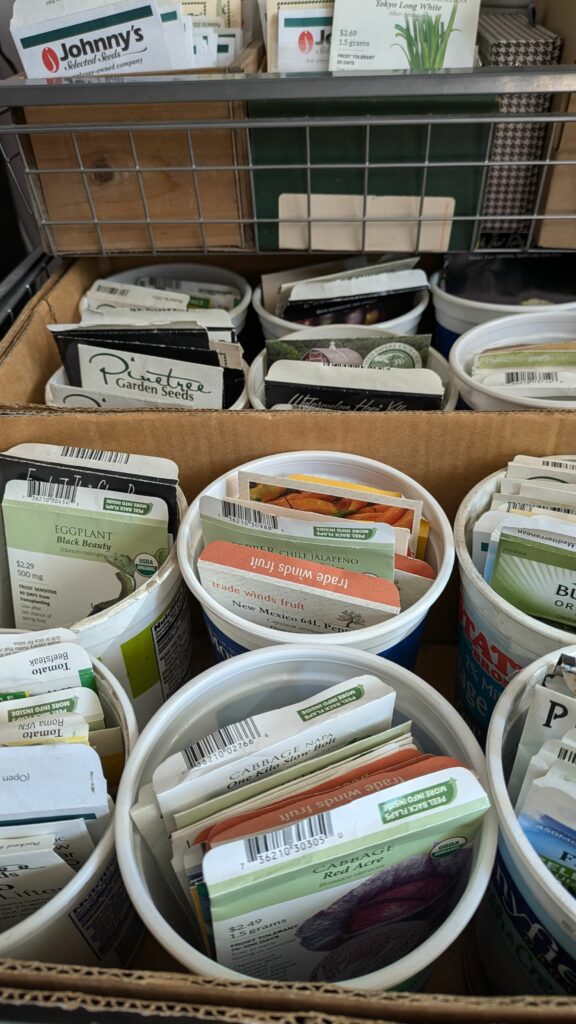
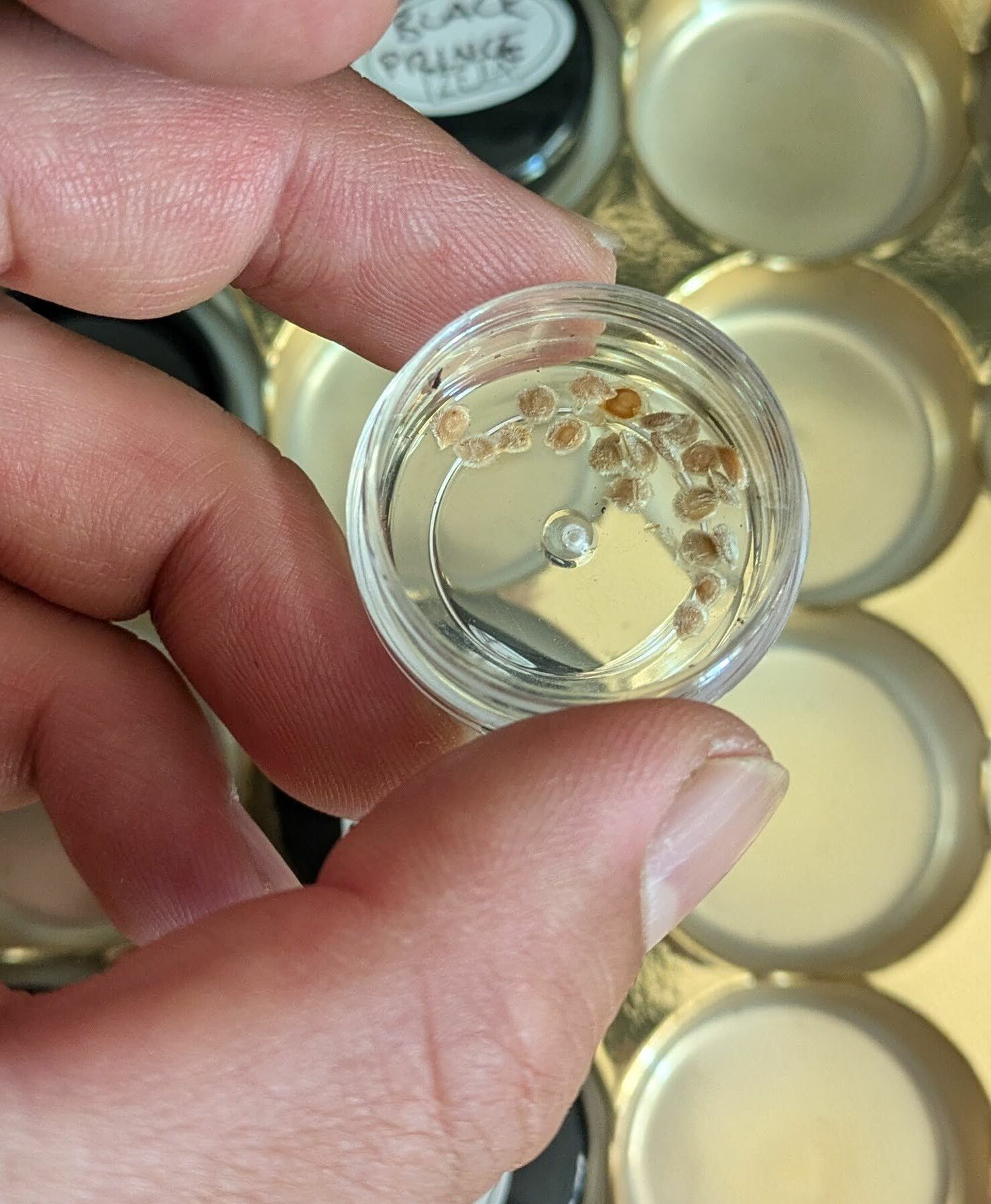
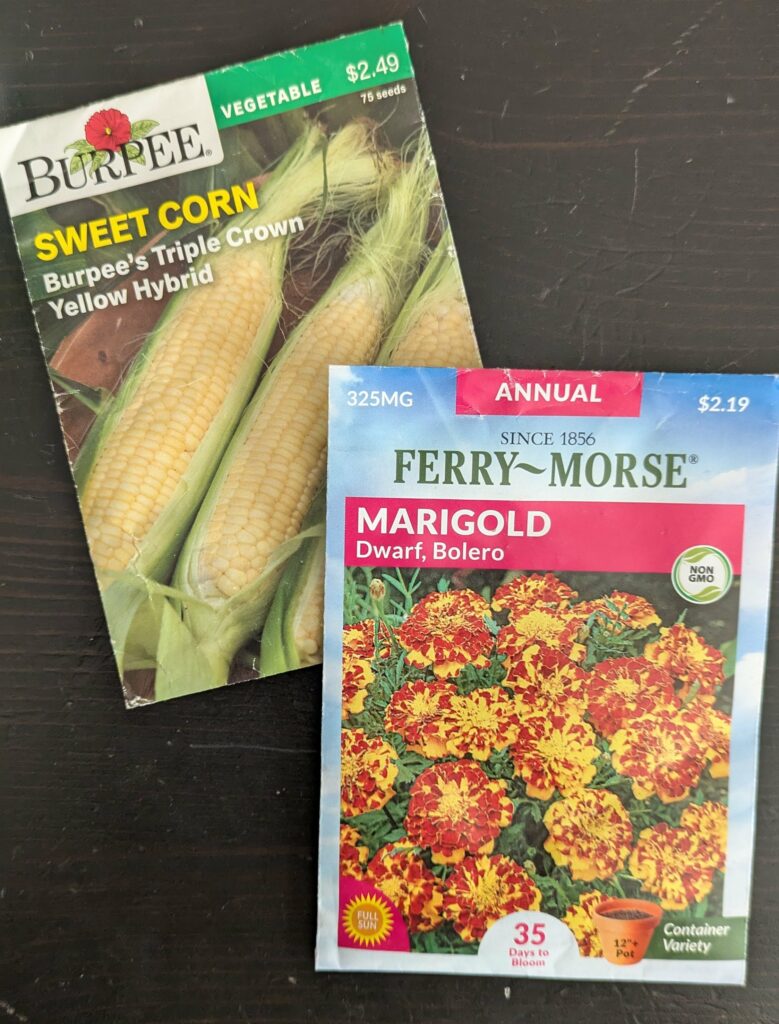
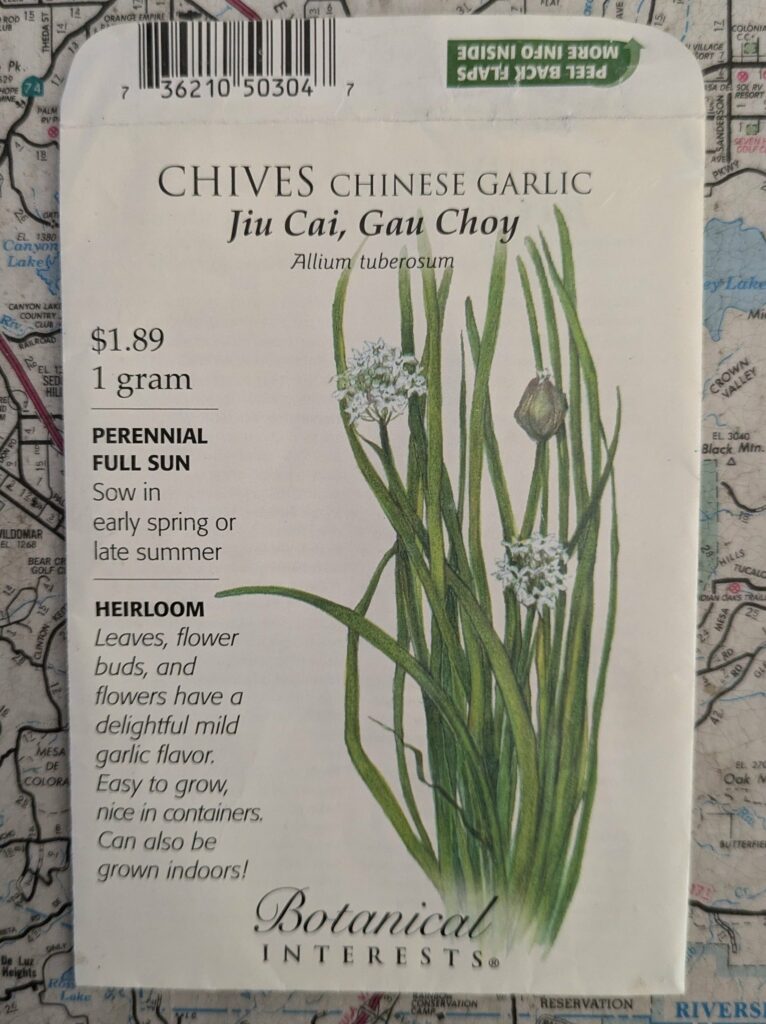
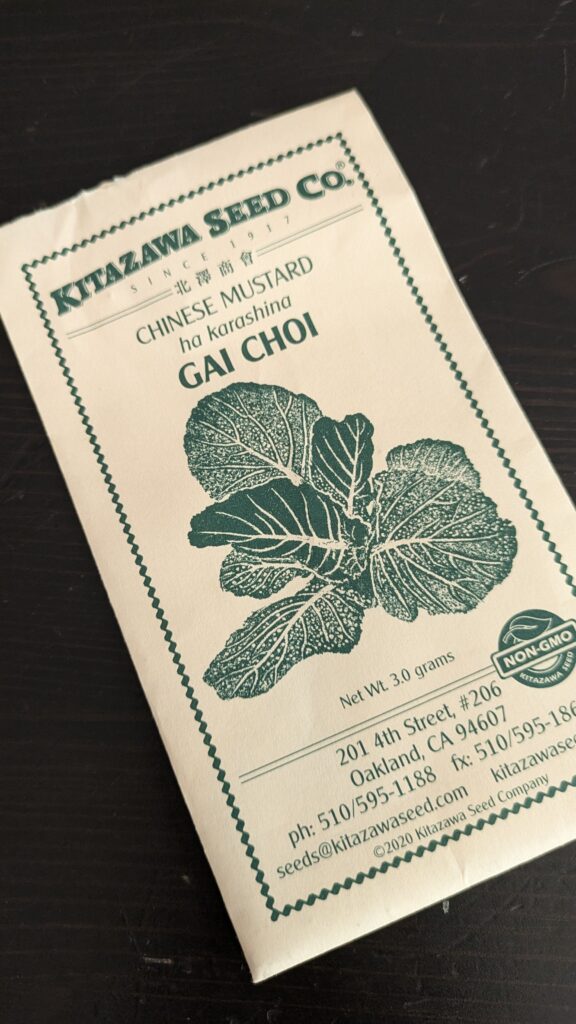













![#gardentotable #dưamón (Vietnamese dried then refrigerator pickled daikon radish) with my aunt's homemade #banhtet (sweet rice roll with mung bean and fatty pork seasoned with salt & Sichuan pepper*; tightly wrapped with banana leaves and boiled.)
*Teochew variation
Banh Tet is 'Cake of the Spring Festival.' It is made and given as gifts in South Vietnam and where this culture resides. [Photo 4: banh Tet dressed with festival paper.]
It is therefore a common food of the #springfestival. [Photo 3: banh Tet before it is crisped up with some oil on a pan.]
While it is often crisped up and consumed, an accompanying pickle can be used to add another element to this simple comfort food. From our garden we used a volunteer daikon radish and a couple of 'Bolero' carrots. I made this from memory of my dad making it. I cut the daikon into steak fries shape and dehydrated them. For the brine my mom advised. It consists of fish sauce, sugar, and water. The concentrates are dependent on taste and the strength and salinity of the fish sauce.
My dad preferred it on the saltier side; whereas traditional Vietnamese flavor profiles prefer salty and sweet.
[Photo 2: All said and done, reusing a food jar is key to maximum wholesomeness 😉😝😅]
Note: There appears to be two variations of dua mon-- traditional Vietnamese and Teochew. By dehydrating instead of sweating (partially removing water,) the daikon is crunchy and elastic; making it a very classic #teochew texture profile.
See more Spring Festival/Chinese Lunar New Year/#Tet posts at: #ned_springfestival](https://scontent-bos5-1.cdninstagram.com/v/t51.29350-15/427935298_939543330529922_6652804083994273886_n.heic?stp=dst-jpg_tt6&_nc_cat=105&ccb=1-7&_nc_sid=18de74&_nc_ohc=vkEDByqoZx0Q7kNvgHmpPVO&_nc_zt=23&_nc_ht=scontent-bos5-1.cdninstagram.com&edm=ANo9K5cEAAAA&_nc_gid=AQ0O70jJaui1vEB9PUvt3AX&oh=00_AYBk3qRj1cCMa6BqfnEwNod7NHlW62OWfOkbJHhY2vTRcw&oe=675657AE)


 . The ghostly photo was create
. The ghostly photo was create


